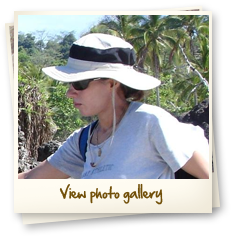

Dr. Mandy Meriano is a hydrogeologist. She received her PhD from the University of Toronto in November 2007. Her research focused on the nature of groundwater flow and impacts of urban development on water quality. Prior to beginning her PhD studies, Ms. Meriano worked as a hydrogeologist for Golder Associates, an environmental engineering consulting company based in Mississauga, Ontario where she investigated and assessed properties for signs of contamination and assisted with site remediation. She has been involved as a speaker for the Earth and Space Week hosted by the Ontario Science Centre and has volunteered for several years as a science fair judge for the Toronto Sci-Tech Fair. She is a member of International Association of Hydrogeologists and Geological Association of Canada and has published articles in several international journals. Ms. Meriano has two sons and has been living in Markham, Ontario. She recently accepted a research position with the National Institute of Water & Atmospheric Research in New Zealand and will be moving to Christchurch, NZ in the fall of 2008.
A: Hydrogeologist. I track the flow of groundwater and contaminants in the subsurface.
A: I recently finished my PhD at the University of Toronto. I'm currently working on several manuscripts for journal publications in the field of groundwater flow and contaminant transport.
A: I work all sorts of hours. But, most of my fieldwork is done during the daytime.
A: I work in the office, laboratory and field.

A: I use drill rigs to install wells that will allow me to monitor and sample groundwater. I also use monitoring instruments out in the field and analytical instruments in the lab to learn about groundwater chemistry. Additionally, I use computer models to help visualize how groundwater moves in the subsurface.
A: A university degree in geology or environmental science is required to do my job. Field or outdoor training is a very important part of this learning experience.
A: Inquisitive, patient, detailed, analytical, critical thinker. You also have to love the outdoors!
A: $50,000 to >$100,000
 Q: What do you like best about your job?
Q: What do you like best about your job? A: Learning about new areas and their challenges and figuring out the processes that makes these systems work.
A: As an earth scientist you get to travel, work in remote areas that many people never get to visit, and meet many interesting people.
A: In the industry, you can make your way up to manager, vice-president, etc. In the academe, you can become a professor.
A: It's relatively demanding. You have to be able to hike, to carry your field equipment, and put up with inclement weather.
A: Because I believe that we must manage our water resources so everyone on this planet can have access to clean water and sanitation. And for that we need to learn about the earth systems and how they work.
A: My most memorable moment as an Earth scientist, so far, has been observing volcanic activity. Arenal, an active volcano located not too far from the small town of Fortuna in Costa Rica, spews plumes of gas and ash every few minutes to a few hours that rise more than a kilometre in height. Witnessing these eruptions was an amazing experience. The most spectacular, however, was at night, when I was able to see stunning jets of incandescent lava that left luminous trails behind them as they rolled down the side of the volcano.
A: Learn your sciences, be inquisitive, ask questions, and have fun.